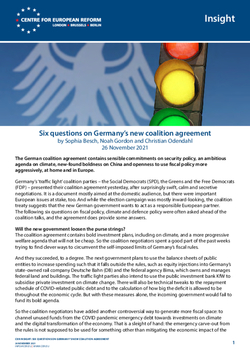
Six questions on Germany's new coalition agreement
The German coalition agreement contains sensible commitments on security policy, an ambitious agenda on climate, new-found boldness on China and openness to use fiscal policy more aggressively, at home and in Europe.
Germany’s ‘traffic light’ coalition parties – the Social Democrats (SPD), the Greens and the Free Democrats (FDP) – presented their coalition agreement yesterday, after surprisingly swift, calm and secretive negotiations. It is a document mostly aimed at the domestic audience, but there were important European issues at stake, too. And while the election campaign was mostly inward-looking, the coalition treaty suggests that the new German government wants to act as a responsible European partner. The following six questions on fiscal policy, climate and defence policy were often asked ahead of the coalition talks, and the agreement does provide some answers.
Will the new government loosen the purse strings?
The coalition agreement contains bold investment plans, including on climate, and a more progressive welfare agenda that will not be cheap. So the coalition negotiators spent a good part of the past weeks trying to find clever ways to circumvent the self-imposed limits of Germany’s fiscal rules.
And they succeeded, to a degree. The next government plans to use the balance sheets of public entities to increase spending such that it falls outside the rules, such as equity injections into Germany’s state-owned rail company Deutsche Bahn (DB) and the federal agency Bima, which owns and manages federal land and buildings. The traffic light parties also intend to use the public investment bank KfW to subsidise private investment on climate change. There will also be technical tweaks to the repayment schedule of COVID-related public debt and to the calculation of how big the deficit is allowed to be throughout the economic cycle. But with these measures alone, the incoming government would fail to fund its bold agenda.
So the coalition negotiators have added another controversial way to generate more fiscal space: to channel unused funds from the COVID pandemic emergency debt towards investments on climate and the digital transformation of the economy. That is a sleight of hand: the emergency carve-out from the rules is not supposed to be used for something other than mitigating the economic impact of the pandemic, and courts will take a very hard look at this arrangement. But the fiscally hawkish lawyers in the FDP (there are many) will have triple-checked the legal limits of this option. A budget that fails in front of the courts would be the ultimate embarrassment for the FDP’s incoming finance minister, Christian Lindner.
With this final option in place, the German government will have the necessary fiscal means for its spending agenda, but it is not the US-style spending spree that fiscal doves may have hoped for.
Will Germany agree to a substantial revamp of Europe’s fiscal rules and to making the recovery fund permanent?
The ways in which Germany can circumvent its own fiscal rules cannot be replicated easily at the European level. Germany’s fiscal rules and Europe’s Stability and Growth Pact are two different legal beasts. But now that Germany is opting for the cheekiest way to circumvent fiscal rules – re-purposing pandemic emergency funds – other eurozone countries will be tempted, and in fact politically encouraged, to do the same: loading up on money borrowed in bond markets while the emergency lasts, to have a cushion for when the fiscal rules start biting again. This will help safeguard the recovery in Europe, but lower the urgency to reform the fiscal rules.
The coalition agreement is open to a reform of the European rules, and in fact outlines the principles of such a reform: ensure growth and preserve debt sustainability, generate “sustainable and climate-friendly investment”, and make the rules simpler and more transparent. Most importantly, the agreement does not rule anything out. Germany’s opening offer in this debate is thus a few general principles and an open door. That is as much as could be expected from this agreement, and is even a bit more than many had feared, considering the FDP’s otherwise tough stance on European fiscal matters.
Making the recovery fund permanent is not explicitly ruled out in the agreement, but there are also no encouraging signs that the incoming German government would be willing to extend it. What the agreement says is: let’s not discuss this now, and make sure the recovery fund is a success first. This, again, is what could have been expected, and is a bit better than feared by some.
Will Germany become a climate leader?
Yes, if it hits all the targets in this coalition agreement. The plans for the long-stagnant transport sector are particularly ambitious. The incoming government wants to have 15 million purely electric vehicles (as opposed to hybrids) on the roads by 2030, up from about 400,000 today. This will require a massive expansion of charging infrastructure, which in turn will pave the way for the EU’s proposed ban on registrations of new fossil-fuelled vehicles from 2035. If it weren’t for the FDP’s hard-won sentence that there will be no general speed limit on the autobahn, it would be hard to tell that this is the governing document for a country obsessed with combustion-engine cars.
The plans for the power sector are equally ambitious: Germany expects electricity demand to increase significantly by 2030 and wants 80 per cent of its power to come from renewables by then, compared to 45 per cent today. The new economics and climate ministry (under Green Vice-Chancellor Robert Habeck) will have to take some immediate, concrete measures on this front in 2022. The treaty also suggests a government-wide approach to climate policy, with a new ‘climate check’ mechanism that requires all ministries to assess the climate impacts of their legislation.
As progressive as this agreement is, it’s also a continuation of advances made over the last few years, both in Germany and at EU level. Germany now plans to phase out coal use by 2030 rather than 2038. But this was almost certain to happen anyway because carbon prices in Europe were rising and existing German climate laws, which the country’s constitutional court forced the outgoing government to sharpen, almost mandate it. The last German government also backed or at least acquiesced to the EU's ‘Fit-for-55’ climate policies that are now limiting this government’s room for manoeuvre. This incoming coalition supports those measures too and realises it must accelerate Germany’s ongoing energy transition.
Is Germany going to exit NATO’s nuclear sharing arrangement?
Germany hosts 60 US tactical nuclear weapons (B61) and provides dual-capable aircraft (Tornado fighters) that may carry these weapons in accordance with NATO’s nuclear sharing arrangement. The risk that the new German government would end the arrangement was a real concern in recent months. The ageing Tornado fleet needs to be replaced before 2030. Some Social Democrat and Green politicians have criticised Germany’s role in NATO’s nuclear sharing, arguing that Berlin should pave the way for a nuclear weapons-free world.
The coalition treaty does state that Germany will join the Treaty on the Prohibition of Nuclear Weapons (TPNW) as an observer. Short of becoming a member, which would prohibit Germany from participating in NATO’s nuclear policy altogether, Germany seeking observer status to the treaty nonetheless irks many of Berlin’s allies. NATO rejects the TPNW, which it considers a naïve distraction from arms control negotiations that include nuclear powers. NATO allies are also worried that Germany joining as an observer might inspire other member-states to do the same, and so divide the alliance.
At the same time however, the new German government appears determined to find a nuclear-capable replacement for the Tornado next year. The coalition agreement stresses the ongoing importance of participating in NATO nuclear strategic debates and planning structures. And the coalition is explicit in its commitment to contribute to a credible deterrence vis-à-vis Russia. So, while there are some internal contradictions here, a major nuclear policy shift does not seem to be on the cards.
Will Germany finally spend 2 per cent of GDP on defence?
The short answer is no. Though Germany is committed to the 2 per cent target laid down at the 2014 NATO Summit in Wales, the target is not mentioned in the coalition agreement. This should not come as a surprise: no party in Germany is a fan of the target. The argument goes that spending as a share of GDP is not a meaningful way to measure military output or contributions to collective security.
The new coalition treaty does commit the government to a 3 per cent target that combines spending on development, diplomacy and defence. Compared to current spending levels that means that there will be increases – the question is where the money will go. The three parties say that they want to enable the notoriously underequipped Bundeswehr (the German military) to do both territorial defence and crisis management operations in the future. If they are serious, they will need to continue the defence budget increases of the last few years. If they instead cut funding, overhead expenses would consume the funds necessary for capability development and procurement and risk affecting Germany’s ability to deliver on its responsibilities to NATO. The long answer is, therefore, that we need to wait for the federal budget to get a sense just how credible this new government’s commitment to invest in their armed forces really is.
Is Germany going to get tough on China?
The tone is definitely getting sharper. The new government talks about ‘systemic competition’ with China, and the coalition agreement mentions Taiwan, the security crackdown in Hong Kong and the human rights abuses in Xinjiang. This change has been coming for a while. It has three main drivers: for one, Beijing played its cards badly in Germany – the outsized Chinese reaction to the EU’s sanctions against Chinese officials over human rights abuses against in Xinjiang at the beginning of 2021 has altered the perception of China among many German decision-makers. German politicians are aware of the bipartisan consensus in the US on countering Chinese influence and have received the Biden administration’s clear message that it wants to co-ordinate China policy with the Europeans – the coalition agreement calls for a transatlantic China policy. And the new coalition is committed to working more closely with its EU partners and putting an end to Germany’s excessive emphasis on exports to and investment in China, which Merkel herself has recently called “naïve”.
A first clear signal of Germany’s new course on China is that the coalition partners do not think the EU-China Comprehensive Agreement on Investment (CAI) should be ratified (the CAI was initially agreed in December 2020, but the European Parliament has frozen the ratification process in light of increased tension between China and the EU). Any future German government will struggle to reconcile a strict China policy with German economic interests. But the coalition treaty is an expression of a new, tougher German consensus on China.
Sophia Besch is a senior research fellow at the CER, Noah Gordon is head of the Transatlantic Climate Bridge and climate columnist for Internationale Politik Quarterly and Christian Odendahl is chief economist at the CER.


Add new comment